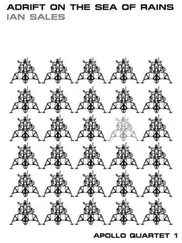NASA makes the announcement about Apollo 12 in April of 1969, and while all the attention is rightly directed at Pete Conrad, Al Bean and Dick Gordon, the Apollo 12 prime crew, a few weekends after the press release, Ginny and Walden are invited to Dave and Lurton’s ranch-style home in Nassau Bay for a celebration. Al is there, but not Pam, the two have been separated for about six months—and there are some in the Astronaut Wives Club who feel that should make Al ineligible for a flight, they’ve stuck by their men through thick and thin, good and bad, they have made sacrifices , and Pam has let them all down. But Ginny is not one of them. She was sad to see Pam leave, she always liked her, they were friends, if not especially close ones—Ginny’s closest friends she has never actually met in person, they’re the people she corresponds with and whose names she sees in the pages of the magazines she reads.
Back in Edwards, everyone partied hard, but the mantle of responsibility laid across the astronauts’ shoulders by the nation has left them subdued and more inclined to work off their frustrations in the privacy of their own homes. For Ginny, this has meant fights, nights where Walden silently and sullenly chugs beer, the two of them occasionally sleeping in separate bedrooms and reproachful apologies the following morning. She knows Walden is under pressure, that the work is hard—she is trying herself to understand what NASA is asking of him… although she has not yet worked up the courage to tell him so.
Dave has been in space twice before, on Gemini 8 and Apollo 9, and Walden has admitted to her he couldn’t have asked for a better commander. The Apollo 11 crew were later described by Michael Collins as “amiable strangers”, but the Apollo 15 crew are as close as long-time colleagues. Tied together by shared memories of Edwards, by careers that have trod similar paths, they are alike enough to be comfortable in each other’s presence, and yet different enough not to cavil at their enforced closeness. In Falling to Earth , Al Worden describes Dave Scott as “the quintessential professional”, Jim Irwin as “restrained and reticent” and Scott’s “yes-man”; and in reference to his own role: “[Scott] wanted things his way, but on a few occasions I had to tell him, ‘Well, Dave, I am not sure I want to do it like that.’” The crew had, in Worden’s words, “a bond of competence and professionalism”. Imagine a similar dynamic at play with Walden J Eckhardt in Jim Irwin’s place. When Walden’s conversation becomes peppered with “Dave” and “Al”, Ginny is at first glad everything seems to be going so well; but it soon palls. She looks forward to the days when Walden is at the Cape, and she will not be sharing the bed with her husband and the ghosts of his crew-mates.
The Scotts’ party takes the form of a luau, though neither Ginny nor Walden have been to Hawaii and so can’t vouch for its authenticity. The shirts are certainly Hawaiian—the Scotts have provided suitable garments for Al and Walden. And there are pineapples and a barbecue with far too much meat. Ginny is no stranger to barbecues, they were regular occurrences at Edwards, but there is something desperately festive about this one. It’s not just the ridiculous paper leis, or the paper lanterns strung across the garden, or even the cake with the Moon drawn in blue icing on its top.
Ginny sits alone at a table, in a plain red top and white capri pants—her concession to the theme, though several of the other wives are in muumuus, but now she thinks about it maybe they wore capri pants in Girls! Girls! Girls! and not Blue Hawaii —and sips from some fruity cocktail which boasts a pair of swizzle sticks and a paper umbrella, Lurton told her the name but she can’t remember it. And she’s thinking about the short story she finished a few days ago, the third since she discovered how to write again, the third since she started to make good on her epiphany in the LM simulator all those months ago, the third since she’s been working her way secretly through her husband’s training manuals. Not all of the stories have worked, often some vital narrative element seems just beyond her grasp, and the one she has sent out has not sold, the rejections sadly uninformative on the story’s flaws.
Hey, why so glum, asks Dave, as he marches past bearing a huge bowl of potato salad.
Ginny starts. Uh, I was a million miles away, she tells him. She considers adding she was in fact only a quarter of a million miles from Houston, Texas, somewhere in the vicinity of the Sea of Tranquility, designated Apollo Landing Site 1. But he has already swept past.
Apollo 11 will actually land at Apollo Landing Site 2, also in the Sea of Tranquility, but some 150 miles west of Site 1. Ginny cannot know this, of course, not in April 1969, as NASA has not yet announced where the first lunar landing will take place.
She watches Dave bear down on the table at the other end of the patio and begin sorting the plates and dishes on its top to find room for the potato salad. Although the food has been made by the wives, the men always take charge during a barbecue, presenting the various dishes as if they themselves were responsible for the salads and sauces and condiments.
A hand settles on her shoulder and Ginny looks up to see a man smiling down at her. He is wearing aviator sunglasses and has a bottle of beer in one hand. For one brief moment, she wonders who he is—and is thrown into even more confusion when Dave turns and yells, Hey, Swede!
Swede? Ginny asks her husband.
It’s nothing, hon, says Walden, just a dumb nickname.
He walks away. She can hear the chatter of the other wives behind her, busy doing something inside the house, and now the men have congregated at the barbecue, leaving Ginny alone and between the two groups. She should be indoors, joining in the gossip, helping with the food preparation which remains to be done, she’s a fully paid up member of the AWC and she’s been in it now for two and a half years. But she sits at the table by herself and thinks about the future.
Not just the future of the here-and-now, Walden backup crew for Apollo 12, which is due to fly later this year, but also Walden prime crew for an upcoming flight to the Moon. And because he has specialised in the lunar module, has spent the last eighteen months studying it, because it is his spacecraft, so he is LMP, which means he will certainly be setting foot on the lunar surface. But there is also the future of Ginny’s invented worlds—and there’s that famous story of Judith’s which opens, “Martha begat Joan and Joan begat Ariadne. Ariadne lived and died at home on Pluto, but her daughter, Emma, took the long trip out to a distant planet of an alien sun”. But who needs an alien sun when there’s an alien world hanging over everyone’s head, and the more Ginny learns of the science and engineering of putting a man on the Moon, the more she realises how astonishingly difficult a task it is, and the freedom of the galaxy, as practiced by her friends and peers, seems a thing so very fanciful, so much more so than imagining a woman walking through lunar regolith—and that’s something she supposes will never come to pass.
The wives spill out into the garden, in their vibrantly-coloured muumuus and dresses, and the men mill about with their bottles of beer, and Ginny sits alone in the centre of what feels like a whirlwind of activity, as if time has slowed for her, everyone moving so fast, their voices an unintelligible gabble, and the irony of her situation, that she, someone who travels forward in time in her stories, does not escape her.
And then Walden is looming over her and she puts her empty glass on the table and rises to her feet, tottering a moment on her high-heeled mules. The sun is sinking, spraying reds and oranges across the darkening sky, like fire splashing over a launch pad as a Saturn 1B lifts off, not that Ginny has seen one in person, only some footage on television and photographs in magazines. She smiles at her husband as he snakes an arm about her waist and pulls her in close, and this is the most intimate he has been in over a year— No, not “intimate”, he has been that, their sex life has suffered but it still limps along. This is the most husbandly he has been since they moved to Houston—holding her close, and she knows she loves him for all his faults, and she knows he reciprocates the feeling in his own way, and looking across to the other astronauts and their wives, she thinks, what an extraordinary group of people we are and what an extraordinary time this is to live. The things we are doing here in Houston, in just a few short months we will put a human being on the Moon—and the realness of it is palpable, is there to be felt in the muscular arm encircling her waist, in the warmth of Walden’s body pressed against her own, in the drunken gestures and bright chatter, the toothsome smiles and wholesome features. There’s such a sense of community to this gathering, one that science fiction, for all its decades of stories and letter columns has never quite managed.
Читать дальше












